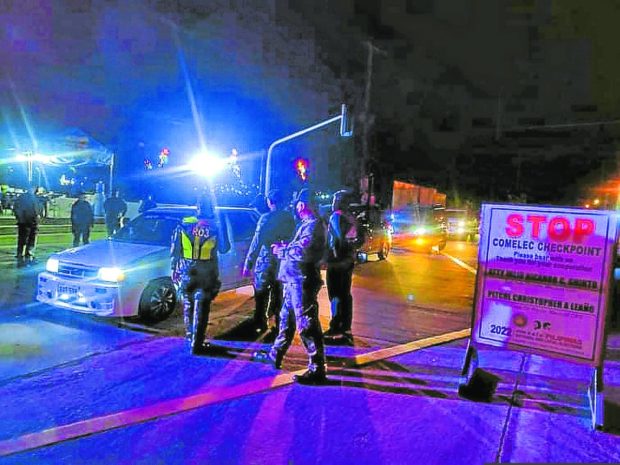1,700 cops, soldiers to man gun ban checkpoints in Central Luzon

MIDNIGHT CHECK A police checkpoint is put up in front of the Bulacan provincial capitol along MacArthur Highway in Malolos City to enforce the May 2022 election gun ban that takes effect on Sunday and will end on June 8. —CARMELA REYES-ESTROPE
CITY OF MALOLOS, Bulacan, Philippines — More than 1,700 uniformed personnel began manning checkpoints throughout Central Luzon at midnight as the election gun ban took effect on Sunday.
The checkpoints set up initially in 153 key areas of the region will be operating until June 8.
The Commission on Elections (Comelec) has set the election period for the May 9 general elections from Jan. 9 to June 8, during which time the gun ban is also in effect.
Licenses to carry weapons, often granted to private and government security personnel, including those designated to protect government officials, were automatically recalled from the moment the gun ban took effect, said lawyer Gloria Ramos-Petallo, Comelec Central Luzon director.
Hot spots
She said all government and private individuals, including the police and the military tasked to man the checkpoints, were expected to secure a certificate of authority to carry and transport firearms from the Comelec.
The checkpoints are designed to discourage violence in traditional election hot spots, added Elmo Duque, assistant director and spokesperson for the Comelec in the region.
The Central Luzon Police Office has started evaluating this year’s list of election hot spots, which initially included San Simon town in Pampanga province and an unnamed municipality in Nueva Ecija province, said Police Brig. Gen Matthew Baccay, Central Luzon police director.
The government has deployed 1,326 policemen, 80 soldiers, 8 firefighters, 30 employees of municipal disaster risk reduction management offices and 271 volunteers, like village watchmen, to secure these checkpoints in Bulacan, Pampanga, Bataan, Tarlac, Zambales, Aurora and Nueva Ecija provinces.
Every city and town of the region would be designated at least one checkpoint manned by five to seven personnel, Baccay added.
The checkpoint personnel would also help enforce health protocols by asking motorists to present their COVID-19 vaccination cards. “We do not allow motorists to cross borders and pass through control points without vaccination cards,” Baccay said.